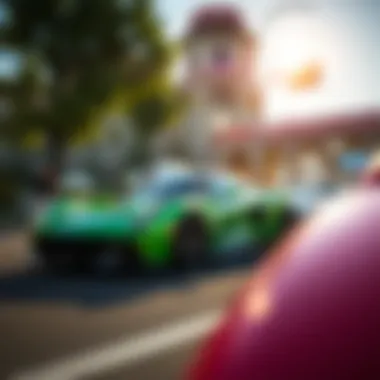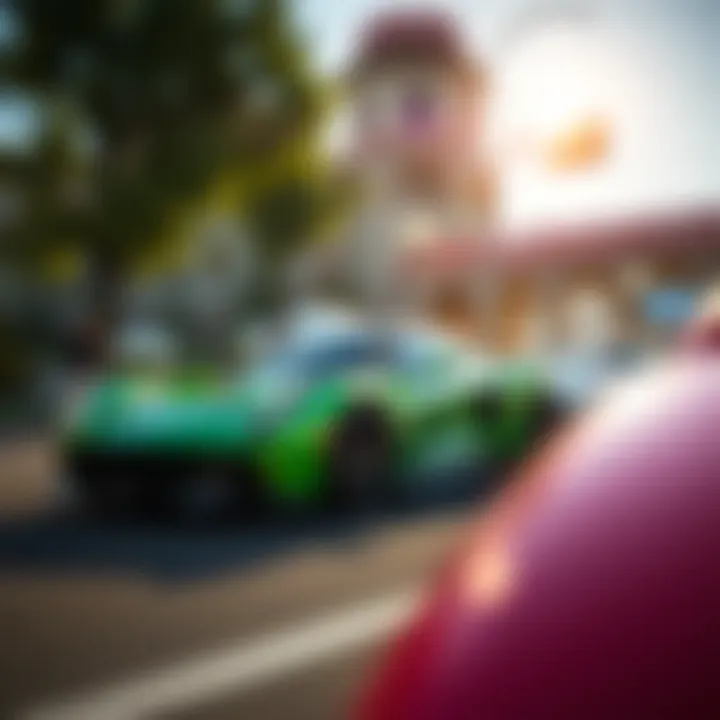Exploring Innovations and Impacts of Forza Horizon


Intro
The racing genre has always had a magnetic pull, drawing in fans from all walks of life. The latest entry in the Forza Horizon series continues this tradition, standing out not just for its fast cars or picturesque locations but for its innovative take on gameplay mechanics and community involvement. With a balance of realistic graphics and engaging elements, this installment captures the essence of what makes racing games compelling.
What sets this Forza Horizon apart? It’s not merely about putting the pedal to the metal; it's a tapestry woven with technological advancements, cultural relevance, and the ever-growing gaming community. As this article unfolds, we will delve deeper into areas like the latest updates, provide thorough reviews, share golden tips for players, and spotlight what’s trending in the gaming domain—all while linking these insights back to the broader significance of this racing title.
Understanding these elements isn’t just for casual gamers; it's vital for anyone who wishes to grasp the evolution of gaming mechanics and the narratives surrounding them.
Let’s kick things off with the latest buzz in the scene.
Overview of Forza Horizon
The Forza Horizon series, a brainchild of Playground Games, has carved a unique niche in the realm of racing games. More than just a sequel, each installment reflects a fulcrum of innovation, capturing the essence of automotive culture while simultaneously advancing gaming technology. As we delve deeper into this latest edition, it’s crucial to understand its evolution, the cutting-edge advancements that it brings to the table, and its broader implications in the gaming industry.
This overview serves as a lens through which we can gauge not only the gameplay mechanics, but also how the series has influenced and reshaped perceptions within the racing genre. An understanding of the Forza Horizon legacy enriches our appreciation of this release, highlighting how it blends thrilling gameplay with realistic automotive experiences.
The Evolution of Forza Horizon
The leap from the original Forza Horizon to its most recent iteration is nothing short of remarkable. Initially launching in 2012, the franchise introduced players to an open-world environment where freedom reigned supreme, allowing for exploration beyond traditional racing circuits. Over the years, the series has adopted a philosophy of continual enhancement, embracing community feedback and technological advancements.
Each game has taken steps to build upon its foundation, like the inclusion of dynamic weather systems, seasonal changes, and more realistic driving physics. The recent edition promises to push these boundaries further, drawing in new players while satisfying veterans with familiar elements that fans love. For instance, the integration of real-world locations and events continues to give players a taste of authenticity, while the storytelling approach enhances emotional engagement.
The Significance of the Series in Racing Games
The Forza Horizon series stands out not only due to its mechanics, but also its impact on the racing genre as a whole. It has set benchmarks that other games aspire to achieve. Unlike sim racing titles that adhere strictly to realism, Forza Horizon blends arcade-style fun with authentic vehicle dynamics, which attracts a wider audience.
- Cultural Representation: The series consistently showcases a diverse range of vehicles, from classic muscle cars to modern hypercars. This inclusive representation fosters a connection between players and their automotive aspirations.
- Player Engagement: Elements like car meets, online competitions, and community challenges create an ecosystem where player interaction thrives.
- Innovation of Features: Features such as ForzaLink, which facilitates seamless online connection, define the series' commitment to enhancing user experience. This focus on community-building has made it not just a game but a social hub for car enthusiasts.
As we continue to explore these facets of Forza Horizon, it becomes evident that its influence transcends beyond merely being a racing game; it’s a phenomenon that captures the spirit of modern gaming culture.
"In racing games, the connection between player and vehicle is paramount; Forza Horizon elevates this connection into a celebrative culture."
Technological Advancements
The latest iteration of Forza Horizon showcases how advancements in technology can redefine the gaming experience. These enhancements are not just mere upgrades; they revolutionize player engagement, visual fidelity, and gameplay dynamics. As every year brings new tech innovations, racing games like Forza Horizon capitalize on them to provide a more immersive experience. Let's delve into the key technological upgrades that make this release stand out.
Graphics Enhancements
One of the most striking aspects of the new Forza Horizon is undoubtedly its graphics. The visual fidelity has taken a quantum leap, pushing the boundaries of realism. With better lighting, improved textures, and details that make players feel as though they’re racing in a true-to-life environment, the experience is nothing short of breathtaking.
The incorporation of ray tracing techniques allows for reflections that respond to the environment in real-time, adding layers of depth to each race. Imagine zipping through streets where sunlight glints off your car, mimicking the sparkle from real-world asphalt. The new dynamic weather system also plays a pivotal role; the rain, fog, and shifting light conditions turn every race into a unique visual spectacle.
"In the world of racing games, visual improvements can often be the difference between merely playing and utterly immersing oneself in the experience."


Physics Engine Updates
The physics engine updates are just as critical as the graphics. This latest version introduces more sophisticated algorithms that simulate vehicle behavior more accurately. Now, players can feel every twist and turn in the road, enhancing the excitement of high-speed maneuvers.
With improved tire friction models and realistic weight distribution, the car handling feels genuine. This means on tight corners, players need to consider speed and momentum as they would in real life. Small changes can send drivers careening into the grass or allowing them to take that corner just right. The newfound authenticity changes the way players interact with their vehicles, making each race an adventure where skill and technique hold the reins.
AI Integration in Gameplay
Artificial intelligence plays a vital role in shaping the gaming experience. The integration of advanced AI systems has elevated the driving companions, enhancing challenge and engagement. Cars on the virtual track are no longer mere NPCs; they exhibit dynamic behaviors, adapting to players' strategies and maneuvers.
The AI racers can learn from the player's driving style, making them formidable opponents. They push players to not only race but also strategize, outsmarting opponents in real-time situations. The thrill of a closely fought race is taken to new heights when every decision on the track counts. It’s the blend of tech and skill that makes victory so rewarding.
As a whole, the technological advancements in Forza Horizon are pivotal to creating a racing game that feels alive, challenging, and immersive. Through breathtaking graphics, revolutionary physics, and smarter AI, players are not just spectators in a race but active participants in a constantly evolving competition.
Gameplay Mechanics
In the realm of modern racing games, the gameplay mechanics can make or break the overall experience. For the latest Forza Horizon, this holds particularly true. Gone are the days when a standard checkered flag defined victory. Now, every twist and turn, every upgrade and customization, has its weight, carving a path not just for players but for the broader genre itself.
New Vehicle Customization Options
The freedom to personalize vehicles beyond mere paint jobs is one of the most significant shifts in Forza Horizon. Players can dive deep into the nitty-gritty of tuning—engine swaps, suspension adjustments, and even the choice of tires. For example, someone could transform a Chevy Camaro into a drift machine capable of tearing up the streets. The introduction of a broader array of customizable parts gives an almost mad scientist level of control to the players.
Moreover, the new visual customization options enable players to express their style, whether it’s a racing stripe or an elaborate graphic design that stands out in a crowded field. Notably, this isn’t just about looks; it has a tangible impact on performance. The right weight distribution can enhance handling, while aerodynamic kits may cut down on air resistance during high-speed chases.
Customization appeals to the gamer’s identity, making every vehicle a reflection of personality and preference.
Innovative Racing Modes
Innovation doesn’t just stop at customization; racing modes have expanded tremendously, inviting players into diverse scenarios. The introduction of community-driven challenges allows players to create and share their races, bending traditional rules. Imagine setting your own race tracks or designing a series of objectives that could completely change how a race is typically approached.
Time trials now come with elements of strategy, forcing competitors to rethink their approach instead of just flooring the gas pedal. Equally, the introduction of team events encourages camaraderie and competition, bringing fans together not just to race but to strategize. This transforms the racing culture, turning it into a social spectacle where player interactions unfold, leading to a well-integrated community experience.
Integration of Open World Dynamics
Forza Horizon's approach to open-world dynamics elevates gameplay in ways that feel both familiar and refreshingly new. The world is not merely a backdrop; it’s alive with activities that impact gameplay. Casual players can explore scenic drives, while hardcore gamers can engage in intense races or scavenger hunts.
Dynamic weather effects and day-night cycles introduce new challenges, forcing players to adapt on the fly. For instance, racing in the rain affects grip and visibility. In contrast, driving at night with limited light pushes even the best players to up their game, ensuring that the environment is a vital component of racing strategy.
Cultural Significance
The cultural significance of the new Forza Horizon transcends mere gaming; it sets the stage for a conversation about automotive passion in a digital age. Racing games have always captured the imagination, but this installment takes it a step further. By integrating diverse cultural themes and rich automotive history, it encourages players to engage not only with the virtual tracks but with the automobile industry itself.
Representation of Automotive Culture


Forza Horizon's vibrant depiction of automotive culture is like a melting pot of styles, resonating with enthusiasts of all kinds. From classic muscle cars to sleek electric vehicles, players experience a wide array of automotive designs, steeped in history and character. Whether tearing down a dirt road in a vintage rally car or cruising through city streets in a modern supercar, each vehicle is a nod to the cultural narratives surrounding it.
Themes of community are interwoven through the game's design. Players often create online clubs, reinforcing camaraderie and shared passions. This isn't just a game; it’s a movement. One notable aspect is how the game mirrors the evolution of car culture, reflecting changes in technology and societal values. Players can explore not only speed and performance but also the environmental implications of their choices, promoting awareness about sustainability in the automotive world.
Impact on Community and Social Engagement
With its in-depth multiplayer features, Forza Horizon has established a unique platform for community interaction. The integration of social media elements and shared user-generated content leads to a sense of belonging among players.
For instance, players partake in seasonal festivals that often channel real-world events, such as car shows or charity races. This not only boosts engagement but also brings awareness to automotive initiatives and local culture. Such interactions foster deep connections, allowing gamers to form friendships that outlast their time behind the screen.
The game encourages global participation, with players showcasing their custom cars, racing skills, and creative designs. This not only amplifies individual expression but also revitalizes discussions about automotive culture in forums like reddit.com or Facebook. Gamers are often inspired to explore car clubs offline, thus intertwining their digital interests with real-world social dynamics.
Influence on Real-Life Automotive Trends
The new Forza Horizon serves as both a mirror and a beacon for real-life automotive trends. Its emphasis on customization has spilled over to actual car enthusiasts who now seek to upgrade their vehicles in ways inspired by their virtual encounters. The possibilities showcased in this game—ranging from intricate paint jobs to advanced performance tuning—have led to a surge in DIY automotive culture.
Moreover, this game's depiction of electric vehicles is noteworthy; it champions sustainability while still celebrating the thrill of speed. As players conquer virtual roads in eco-friendly cars, perspectives on environmental responsibility are slowly shaped. Societal attitudes towards electric and hybrid vehicles are evolving, with consumers gravitating towards brands that align with these values.
"The game embodies a blend of realism and creativity, pushing forward conversations about how we view modern driving and environmental responsibility."
Ultimately, the cultural significance of the Forza Horizon series is twofold. It not only exhibits the multifaceted nature of automotive culture but also promotes consumer engagement and advocacy. As players traverse digital landscapes, they bring back vital lessons and inspirations that translate into real-world automotive trends. This interplay is crucial, setting the stage for future innovations within both the gaming and automotive industries.
Reception and Critique
The narrative surrounding the new Forza Horizon is rich with varied opinions and diverse critiques. Understanding these reactions is crucial, as they reflect not only the quality of the game but also its impact on the community and the future of the racing genre. When players invest their time and money, they hope for an experience that exceeds expectations. Analyzing feedback reveals underlying sentiments about innovation, gameplay mechanics, and how well the developers listen to player desires. This section aims to dissect critical reviews and player impressions, framing them in the context of the game's place in the broader gaming landscape.
Critical Reviews and Player Feedback
The initial reception of Forza Horizon has been marked by an influx of reviews from critics and players alike. Many enthusiasts expressed their delight over the breathtaking graphics and smooth gameplay mechanics, which keep the adrenaline pumping. A review from IGN highlighted that "the attention to detail in environment design is second to none, providing a vivid playground for every car lover."
However, not all feedback is wholly positive. Some players have voiced concerns regarding the monetization strategies implemented in the game. The presence of in-game purchases has drawn criticism, suggesting that the balance between enjoyment and corporate profit might be tipped too far toward the latter. These mixed responses create a bulging well of perspectives that the developers must navigate carefully to maintain community trust.
Additionally, user feedback collected from platforms such as Reddit showcases a spectrum of player experiences. For instance, a post discussing the thrill of new racing modes received overwhelming support, but a parallel thread condemned certain unrealistic car physics. Positive comments often highlight moments like drift challenges or rally races, revealing features that ignite passion among fans. Still, critical posts amplify community concerns, emphasizing the importance of responsive updates to the game.
Comparative Analysis with Previous Titles
In the grand tapestry of racing games, comparing the new installment with its predecessors can illuminate its unique contributions and shortcomings. Forza Horizon, regarded as a trailblazer in the open-world racing arena, has always set a high bar for itself, and the latest entry is no exception. Looking back at Forza Horizon 4, we see a familiar core but with enhancements that elevate the gaming experience.
Critics note that vehicle handling mechanics have undergone significant revisions, making cars feel more distinct and making the driving experience more authentic. Whereas previous titles used a one-size-fits-all approach to vehicle performance, the new game has introduced nuances that make large and small cars feel vastly different. Gamers are now left musing over the impact of these changes in terms of realism and enjoyment.
Players familiar with earlier versions also highlight the improvement in AI behaviors. In prior iterations, AI racers occasionally demonstrated erratic driving patterns, detracting from immersion. The current AI seems to have a more polished algorithm, offering fair competition that feels realistic without being overwhelming.
"The evolution of AI not only challenges the player but also enhances the authenticity of racing against computer-controlled opponents," one player remarked in discussions on gaming forums.


As a whole, the comparative analysis not only showcases the forward stride of the franchise but also aids in understanding where the innovations are well-received and where they fall flat. This dialogue raises the stakes for future releases, establishing expectations amongst loyal players.
In summary, the reception and critique phase of Forza Horizon reveal a vital conversation in motion. Players crave a sophisticated blend of immersion, engagement, and fair monetization, and how the developers respond to this feedback may very well shape the series for years to come. For a deeper understanding of these points, you can explore communities on Reddit or review detailed articles on platforms like IGN and Kotaku.
Monetization and Economic Aspects
When delving into the intricate landscape of modern gaming, one cannot afford to overlook the pivotal role of monetization strategies, especially within a franchise as celebrated as Forza Horizon. This series has significantly shaped how racing games are perceived and experienced, so understanding its economic model provides crucial insights into its sustainability and growth. The significance of monetization in the context of Forza Horizon isn't just about maximizing profits; it encompasses how players engage with the game and their overall gaming experience.
In-Game Purchases and Their Impact
In the current gaming environment, in-game purchases have become par for the course. Forza Horizon is no exception to this trend, as it offers various options for players to enhance their gameplay experience. These can range from cosmetic upgrades to specific vehicles and performance boosts.
One pivotal aspect to consider is the impact of these purchases on gameplay. For example,
- Diversity of options: Players can choose from an array of customization features for their cars, which enhances their emotional investment in the game. This deeper connection can lead to prolonged engagement.
- Balance of gameplay: While in-game purchases might offer players an edge, the developers generally implement measures to ensure that skill remains the primary factor in winning races. This balance is crucial; if not maintained, the game could turn into a pay-to-win scenario, pushing casual gamers away.
Another consideration is that the economic model not only helps behind-the-scenes financially but also emphasizes community-building, as it often encourages players to share their experiences with new additions. When players flaunt their customized vehicles online, it can create a ripple effect, prompting others to invest in similar options.
"The inclusion of microtransactions in racing games like Forza Horizon illustrates how the gaming industry evolves alongside consumer behavior, balancing profit margins with player satisfaction."
Community Reactions to Monetization Strategies
The community's response to monetization strategies can often dictate a game's longevity. Players are not shy about voicing their opinions, and Forza Horizon has seen its fair share of feedback regarding its economic model.
- Positive Engagement: Many players appreciate the way in-game purchases allow for personal expression within the game environment. The game car culture thrives on customization, and helping players access more features feeds directly into this desire. Players often bolster the community by creating and sharing customized designs online.
- Criticism of Costs: Conversely, there’s a segment of the player base that expresses concern over the pricing structure of these purchases. Some argue that certain items are priced too high, which could siphon enjoyment and spark frustration.
In summary, the feedback from the community regarding monetization can significantly impact development choices moving forward. Keeping an ear to the ground, developers can adapt their strategies to satisfy player expectations while ensuring financial viability for the franchise.
In investigating the monetization and economic aspects of Forza Horizon, it becomes clear that a variety of factors come into play. The integration of in-game purchases not only boosts the financial backbone of the game but also evolves the player experience. Recognizing the delicate balance between profit and player satisfaction remains a key challenge for developers as they navigate future updates and expansions.
Future Prospects
The future of the Forza Horizon series looks not only buoyant but ripe with possibilities. As the gaming landscape continues to evolve, the series has shown the capacity to adapt and thrive in a competitive environment. Engaging with the Forza community, developers have the opportunity to refine gameplay, expand features, and enrich user experience. This section will explore two key facets of future prospects: the potential for expansion packs and downloadable content (DLC), and long-term community engagement strategies.
Potential for Expansion Packs and
One of the most significant advantages of continuous content updates, including expansion packs and DLC, lies in their ability to breathe new life into the game. Gamers are always eager for fresh content that enhances their experience. The new Forza Horizon is no exception. Some of the possible ideas for DLC could range from new cars and tracks to unique game modes or even collaborations with real-world automotive manufacturers.
- New Vehicle Introductions: The potential inclusion of iconic vehicles from renowned manufacturers, such as Ferrari’s latest models or Toyota’s classic designs, can captivate enthusiasts and collectors alike.
- Themed Racing Events: Events inspired by real-world races, festivals, or automotive exhibitions could provide players with unique challenges and rewards.
- Seasonal Changes: Enhancing the open-world environment with seasonal modifications can significantly shift gameplay. Imagine a winter wonderland where snow-capped tracks offer new driving experiences alongside summer’s sun-drenched roads.
To keep the community engaged, the developers can unveil these expansions with teasers and sneak peeks on platforms like Reddit or Facebook. This strategy creates anticipation, firing up excitement and encouraging speculative discussions. Moreover, well-planned DLC can maintain player interest and substantially increase game longevity.
Long-term Community Engagement Strategies
Community engagement plays a critical role in the success of any online game. Forza Horizon's developers have the potential to foster a dedicated player base through a variety of avenues. Building a robust connection with the community not only ensures player retention but also helps developers understand what gamers want.
- Feedback Channels: Offering clear channels for player feedback, whether through forums or in-game surveys, encourages players to voice their opinions and feel valued.
- Competitions and Events: Regularly hosted events like online tournaments or creative contests can spark enthusiasm. These challenges can range from race competitions to design challenges, where community members showcase their creativity.
- Collaborations: Partnering with automotive brands or influencers can expand visibility. Seeing a brand ambassador or a popular streamer engage with the game can attract more players and inspire existing fans to dive deeper.
"Engaging with the community ensures players have a voice, making them more invested and involved in the game's journey."







